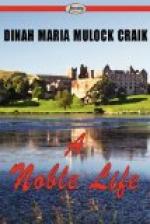No wonder. It lay on her lap, the smallest, saddest specimen of infantile deformity. It had a large head—larger than most infants have—but its body was thin, elfish, and distorted, every joint and limb being twisted in some way or other. You could not say that any portion of the child was natural or perfect except the head and face. Whether it had the power of motion or not seemed doubtful; at any rate, it made no attempt to move, except feebly turning its head from side to side. It lay, with its large eyes wide open, and at last opened its poor little mouth also, and uttered a loud pathetic wail.
“It greets, doctor, ye hear,” said the nurse, eagerly; “‘deed, an’ it greets fine, whiles.”
“A good sign,” observed Dr. Hamilton. “Perhaps it may live after all, though one scarcely knows whether to desire it.”
“I’ll gar it live, doctor,” cried Janet, as she rocked and patted it, and at last managed to lay it to her motherly breast; “I’ll gar it live, ye’ll see! That is God willing.”
“It could not live, it could never have lived at all, if He were not willing,” said the minister, reverently. And then, after a long pause, during which he and the two other gentlemen stood watching, with sad pitying looks, the unfortunate child, he added, so quietly and naturally that, though they might have thought it odd, they could hardly have thought it out of place or hypocritical, “Let us pray.”
It was a habit, long familiar to this good Presbyterian minister, who went in and out among his parishioners as their pastor and teacher, consoler and guide. Many a time, in many a cottage, had he knelt down, just as he did here, in the midst of deep affliction, and said a few simple words, as from children to a father—the Father of all men. And the beginning and end of his prayer was, now as always, the expression and experience of his own entire faith—“Thy will be done.”
“But what ought we to do?” said the Edinburg writer, when, having quitted, not unmoved, the melancholy nursery, he led the way to the scarcely less dreary dining-room, where the two handsome, bright-looking portraits of the late earl and countess still smiled down from the wall —giving Mr. Cardross a start, and making him recall, as if the intervening six weeks had been all a dream, the last day he and Mr. Menteith dined together at that hospitable table. They stole a look at one another, but, with true Scotch reticence, neither exchanged a word. Yet perhaps each respected the other the more, both for the feeling and for its instant repression.
“Whatever we decide to do, ought to be decided now,” said Dr. Hamilton, “for I must be in Edinburg tomorrow. And, besides, it is a case in which no medical skill is of much avail, if any; Nature must struggle through—or yield, which I can not help thinking would be the best ending. In Sparta, now, this poor child would have been exposed on Mount—what was the place? to be saved by any opportune death from the still greater misfortune of living.”




